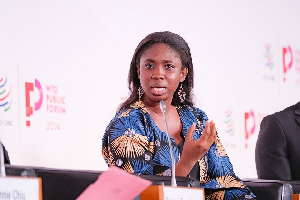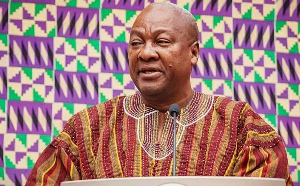Stephanie Eyram Akrumah, Director of the Centre for Green Growth, has called for a deeper integration of environmental concerns into global trade policies during a panel discussion at the World Trade Organisation (WTO) in Geneva.
Speaking at a high-level panel session on “Re-globalizing Trade for an Inclusive Tomorrow: Youth Perspective," Akrumah emphasized that environmental issues are foundational to the future of global trade and that failing to integrate these considerations would be a significant misstep.
“The establishment of the WTO was to regulate and create liberalization of trade that benefits everybody,” Akrumah stated.
She stressed that environmental issues, particularly those related to climate change, have a direct impact on global trade, affecting everything from resources to market stability.
“Where are we going to live? Where are we going to work? Where are we going to trade? If the foundation is not right, we can’t build on anything,” she explained, pointing to the devastating effects of extreme weather events, which can wipe out years of economic progress in a matter of days.
Akrumah also highlighted the unique vulnerabilities of developing countries in the face of climate-related disasters.
“When there are extreme weather conditions and places are flooded, resources are lost. Resources that have taken years to develop go to zero,” she noted, stressing that these setbacks are particularly harmful to nations that are heavily reliant on imports.
“We are huge importers. It’s not something we are proud of, but that’s the reality.”
The WTO, Akrumah argued, has a critical role to play in curbing practices like greenwashing, where companies claim to be environmentally friendly without genuine accountability. She called on the organization to develop frameworks that can better support countries with less negotiation power in international trade agreements.
“When frameworks are developed here, capacity is built for people that don’t have a lot of negotiation power when it comes to bilateral agreements,” she said, adding that such frameworks would prevent corporations from misleading consumers with unverified environmental claims.
Akrumah also addressed the issue of Intellectual Property (IP) within the environmental space, calling it a growing concern.
“There’s IP in environmental-related matters because sometimes, we get a lot of decisions from the top-down, and the bottom-up approach is left out,” she noted.
According to Akrumah, international organizations often co-opt local innovations and ideas on environmental issues without proper recognition or compensation.
“Somebody will take very good ideas on local levels related to environmental issues in trade, and then we see the idea on proposals of some development organizations in Europe. You wonder, how did they get them?" she said.
Moderated by Nicolas Albertoni, Deputy Minister of Foreign Affairs for Uruguay, the panel explored the urgent need for more inclusive trade policies that address the complexities of globalization in the face of climate change, protectionism, and social inequities.
Akrumah’s remarks at the September 13, 2024 event, echoed the panel’s broader theme, which called for concrete actions to ensure that future generations are not left behind in the pursuit of sustainable global trade.
BB
Business News of Monday, 16 September 2024
Source: www.ghanaweb.com













